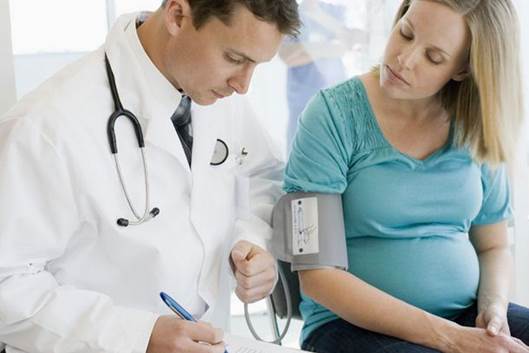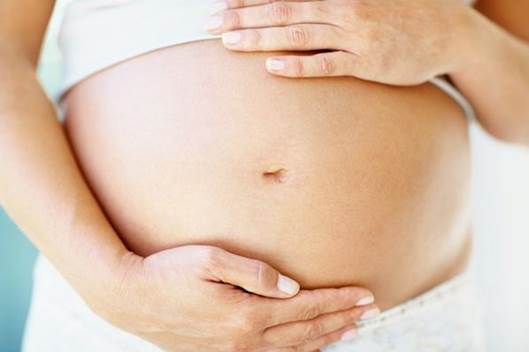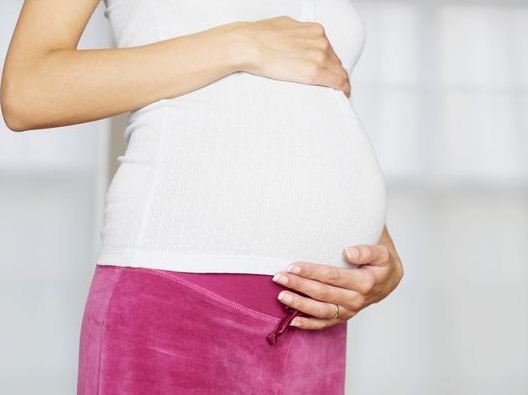Most pregnant women actually have lower
blood pressure than usual. Your heart is working hard to pump a lot more fluid
through your body, and so the pressure drops. The remedy: eat more! Low blood
sugar can make you feel dizzy or faint so keep snacking throughout the day to
counteract hypoglycemia.
When you’re pregnant, your body depletes
many of your nutrients to give to the baby. If you have anemia, this means you
are short of red blood cells to carry oxygen to your organs, which can also
cause that lightheadedness or dizziness associated with low blood pressure.

Your
heart is working hard to pump a lot more fluid through your body, and so the
pressure drops.
It’s often caused by an iron deficiency, so
you can fill up on chicken livers, spinach, broccoli, beans, apricots and
pumpkin. “Red meat also a good source of iron, while plant iron is not that
well absorbed,” says Shirley. “Try to have vitamin C-rich food with iron
sources to increase its absorption.”
If this doesn’t work:
Chat to your doctor about a blood test for
anemia and taking an iron supplement. Lie down on your left side to sleep or
rest so that the blood flow to your heart and brain is maximized.
7. Spots and blotches
The hormone rush of pregnancy gives your
face that lovely pregnancy glow, but the extra oils can also leave you as
pimply as a teen girl before her Matric dance, especially during early
pregnancy. You can wash your face with a gentle cleanser that won’t strip all
the oil off (which just leads to more oil production), but you can eat carrots
too! Vitamin A keeps your skin healthy and it’s found in carrots, milk, fish
and eggs.

Vitamin
A keeps your skin healthy and it’s found in carrots, milk, fish and eggs.
If you’re prone to varicose veins as your
body takes more and more strain with the extra blood volume, eat an orange
because a high dose of vitamin C can help keep veins elastic. But if you’re
dealing with linear nigra or the mask of pregnancy on your belly and face, all
you can do is wait for your pregnancy to end and your skin to go back to normal
over a few months.
If this doesn’t work:
You will just have to live with short-term
bad skin, because you cannot take vitamin A supplements or any acne products.
Too much vitamin A has been linked to birth defects, and it’s the reason the
skin medicine Roaccutane is highly contra-indicated during pregnancy.
8. Fatigue
The tiredness of pregnancy is a special
kind of tired. It can be overwhelming to the point that you couldn’t keep your
eyes open even if Brad Pitt were in your bedroom past 8.30pm. It’s very common
– remember, your body’s construction job, building another human, is massive.
Still, “excessive tiredness in pregnancy can be a sign of anemia,” says
Busisiwe. “It’s no surprise the advice is similar to that for women suffering
from low blood pressure, because they are often experienced together.”

It’s
very common remember, your body’s construction job, building another human, is
massive
So eat your iron-rich foods, such as your
liver, leafy green vegetables, and nuts and legumes – which are also high in
fiber and good for constipation, as Busisiwe reminds us.
A few dried apricots may just be the best,
though. “Dried fruit is higher in iron,” says Busi, “because the drying process
removes water but retains the iron.”
If this doesn’t work:
“Don’t revert to caffeine for wakefulness,”
says Busisiwe. “It’s not good for you during pregnancy.” Rather sleep... while
you can!
9. Headaches
Some women quit coffee when they find out
they’re pregnant – caffeine-deprivation headaches are one theory for why many
pregnant women experience headaches. Doctors are unsure why some women’s
migraines disappear in pregnancy while others suffer from more severe tension
headaches than before. You can’t take any stronger medication than paracetamol
(and even then you want to watch your dosage carefully), so dietary changes are
a good idea for trying to limit headaches.

Some
women quit coffee when they find out they’re pregnant – caffeine-deprivation
headaches are one theory for why many pregnant women experience headaches.
“A void caffeine and alcohol and drink
plenty of water,” advises Busisiwe. While no foods improve or cure headaches,
some are known to trigger them. Try to avoid artificial sweeteners,
preservatives (especially nitrites and MSG) and other triggers such as
chocolate, cheese and pickled foods.
If this doesn’t work:
“It’s worth checking your blood pressure if
you are getting unusual headaches,” says Busisiwe. “They can indicate high
blood pressure which can be a sign of pre-Eclampsia and which needs to be
treated.”
10. Coughs and
sniffles
Pregnancy affects your immune system (as
well as just about every other process in your body) so you are more prone to
colds and flu. Plus, you’re more congested because of the extra mucus produced
when you‘re a baby factory. And guess what – sinus congestion can also add to
those headaches discussed above. What to do? It seems intuitive to avoid creamy
and oily foods such as dairy and fat, as they allow your body to make mucus. As
your body produces more mucus when it is fighting off infection, load up on
fish full of omega oils because they have anti-inflammatory properties.
If this doesn’t work:
A daily probiotic (especially if you’re
avoiding yoghurt) is great for regulating the mucus production in the gut.
Probiotics are healthy bacteria which your body needs, especially in an
environment where the “bad” bacteria are threatening to take over. Lastly, get
your flu injection; it may be the prevention you need.
Shirley norman’s breakfast mix

Shirley
norman’s breakfast mix
·
½ cup high-fiber bran.
·
3 prunes, soaked overnight.
·
One tub of Activia yoghurt (or other yoghurt
with a high probiotic count).
·
Optional: 1 Tbsp mixed seeds, such as linseed,
sesame, sunflower or pumpkin seeds.
·
Blend and drink.
If this doesn’t work:
In extreme cases your doctor may prescribe
a bowel-bulking laxative, but never self-medicate, because stimulant or herbal
laxatives are not safe for use in pregnancy.